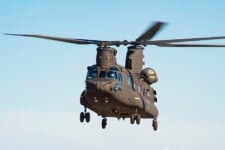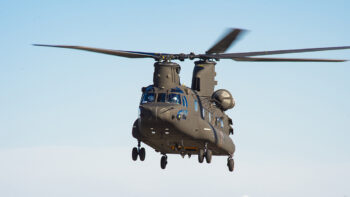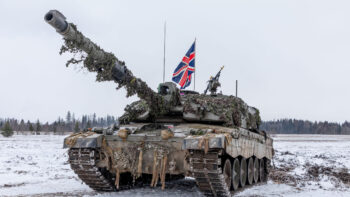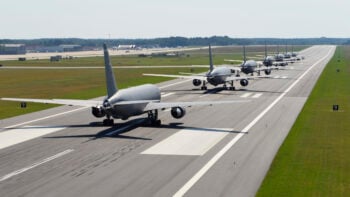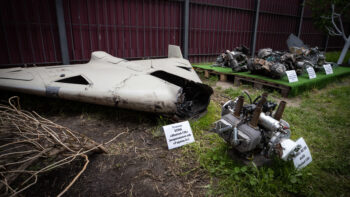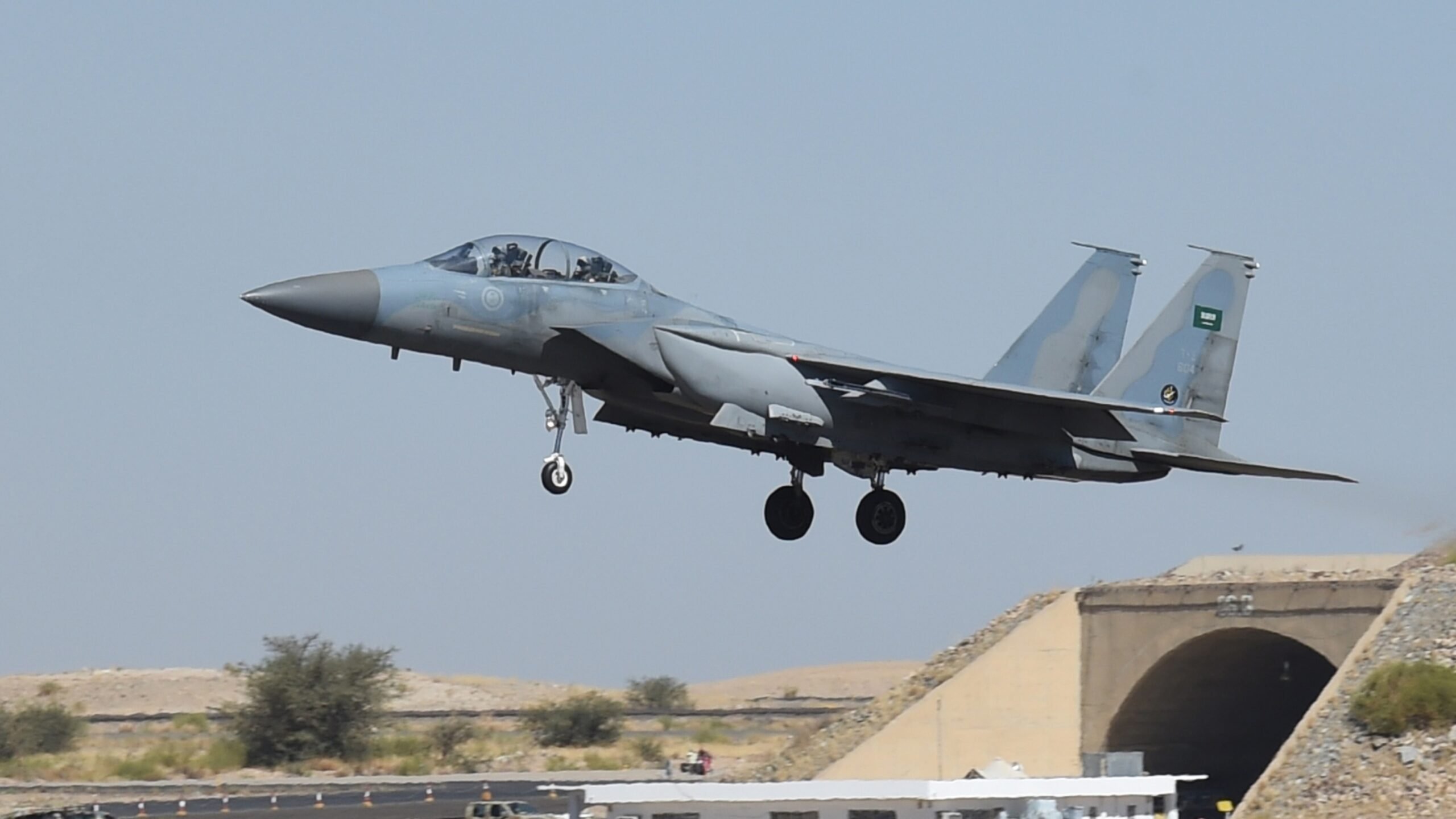
A Saudi F-15 fighter jet landing at the Khamis Mushayt military airbase, some 880 km from the capital Riyadh. (FAYEZ NURELDINE/AFP via Getty Images)
BEIRUT – As every few weeks speculation arises that a new Iran nuclear deal is either hopelessly stalled or potentially imminent, two questions have remained the same: How will Iran’s Gulf rivals react to such a deal, and how would the security arrangement in the region change?
The answer, according to experts who spoke to Breaking Defense, is less than one might think, as Iran is expected to remain a destabilizing force, nuclear pause or no.
“A nuclear agreement with Iran won’t change the security picture all that much. While it will reduce the near-term nuclear proliferation threat, it will neither address Iran’s regional activities nor its missile programs,” said Jon Alterman, director of the Middle East Program at the Center for Strategic and International Studies.
The most recent analysis of the nuclear deal’s status appears to be that it is ebbing away again, after US State Department spokesperson Ned Price said Wednesday the deal is “not our focus right now” compared to supporting protestors of the regime in Tehran. Also, new reporting from the International Atomic Energy Agency alleges Iran had expanded its nuclear enrichment, likely throwing more cold water on the negotiations.
But whether a deal is sealed, either way experts said it won’t end predictions from US allies and especially Gulf countries that Iran won’t change its destabilizing ways in the region, including Tehran’s asymmetric threats in the Arabian Gulf and the Red Sea. With the US increasingly focused on great power competition against the likes of China and Russia — and in sight of reported US tensions with Saudi Arabia over oil — it’s left Gulf nations to modernize their own capabilities.
“Gulf monarchies that fear Iran’s direct or indirect asymmetrical attacks are likely to continue to procure air defense systems to counter potential threats,” said Corrado Cok, a Middle East expert at the Gulf State Analytics think tank. “Saudi Arabia might boost its nuclear sector to set the conditions to reach a nuclear weapon in the event that Iran finalizes its own.”
Beyond defense capabilities, however, Alterman said he considered regional states’ efforts to increase engagement with Iran, including the recent decisions by Kuwait and the UAE to return ambassadors to Tehran, is recognition of the fact that it will take acts of statecraft to secure the region — deal or no deal.
“Military capabilities play a role, but they are just part of the equation,” he said.
The only expert with whom Breaking Defense spoke who considered that the outcome of a nuclear deal with Iran will affect the region’s security balance was Abdullah Al Junaid, Bahraini strategic expert and political researcher — but only in the case that it failed.
“If negotiations with Iran fail, the escalation of asymmetric threats in the Gulf of Oman and the Gulf of Aden is likely to escalate. Therefore, the [US] Central Command, as well as the countries involved securing the waters, will have to develop practical scenarios, or independent on the outcome in the event that the American political decision hinders the implementation of such preventive or proactive measures,” said Al Junaid, who was critical of Saudi Arabia and the UAE not demanding a seat at the nuclear deal negotiating table in the first place.
The US military appears to be moving ahead in the region with its deterrence strategy focused on Iran, including the recent renaming of an operations center in Jordan dedicated to unmanned systems. That came in the wake of at least two sail drone-napping incidents in the Red Sea in which Iran appeared to try to make off with American unmanned vessels.
“Iran is devoting significant resources to boosting its naval capabilities with the aim of creating disruptive new threats to maritime security in the Gulf region,” said Kristian Ulrichsen, Fellow for the Middle East at Rice University’s Baker Institute, “so it is likely that the recent incident is not a one-off, but rather a probe to determine how the US may respond and what countermeasures may be taken.”
For the Navy’s part, Commander Timothy Hawkins, spokesman for US Naval Forces Central Command, U.S. 5th Fleet and Combined Maritime Forces, previously told Breaking Defense, “We will continue to sail, fly and operate anywhere international law allows, including the Red Sea.”
What About A Broader Middle East Alliance?
Whether a nuclear deal happens, in recent weeks talk has arisen about the idea of a strategic alliance between Gulf states and the US — and even Israel — similar to the NATO in Europe. But even after the 2020 Abraham Accords broke the ice between Israel and Bahrain and the UAE, experts said it’s a steep hill to climb.
In June, Jordanian King Abdullah II said in an interview with CNBC that he “would be one of the first people that would endorse a Middle East NATO.” Around the same time, Israeli defense minister Benny Gantz discussed a Middle East Air Defense Alliance, which he dubbed MEAD, between his country and unnamed Gulf partners.
“United States has been trying to promote greater regional defense integration for more than 20 years. While there has been some recent progress, we are still very far from any sort of naval defense alliance,” Alterman said.
Likewise, Giorgio Caffiero, CEO and founder of Gulf State Analytics, said he considered an Arab NATO a farfetched target.
“Regardless of the JCPOA’s fate, it is unrealistic to imagine a so-called Arab NATO being established in the Arab region,” he said. “Although some Arab states such as the UAE are deepening their defense cooperation with Israel, the idea of Kuwait or Iraq entering a military alliance with the Jewish state can be entirely dismissed right off the bat.
“In the case of Saudi Arabia, there is a desire to coordinate with Israel against Iran. Yet, Riyadh will want to do so in ways which are more covert and not so openly visible. One reason pertains to the extent to which Saudi officials fear the effectiveness of Iranian propaganda, which would receive a great boost from the Kingdom entering a formal alliance with Israel,” Caffiero said.
He added that the dynamics between North American and European countries that have enabled NATO to serve as a decades-old alliance do not exist in the Middle East.
“Within the GCC, the lack of trust between Qatar and the states which blockaded the gas-rich country from 2017 to 2021 will probably prevent the six member-states of this sub-regional institution from elevating the GCC into a true military alliance. Moreover, an Arab NATO would be anti-Iranian in nature and countries such as the Sultanate of Oman have made it clear that they do not seek membership in any alliance that is geared toward isolating, weakening, or intimidating Tehran,” Cafiero said.
Army inching towards late FY25 Chinook Block II full-rate production contract
Boeing recently announced the Block II helo’s first maiden flight and plans to deliver the first production aircraft to the service in the coming weeks.
